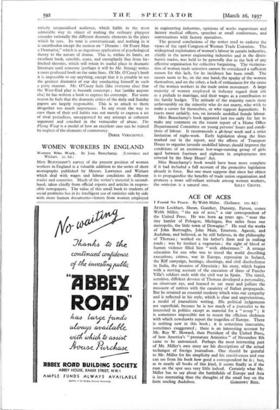WOMEN WORKERS IN ENGLAND
Women Who Work. By Joan Beauchamp. (Lawrence and Wishart. 2 s . 6d.) MISS BEAUCHAMP'S survey of the present position of women workers in England is a valuable addition to the series of short monographs published by Messrs. Lawrence and Wishart which deal with wages and labour conditions in different trades and countries. Much of the writer's material is second- hand, taken chiefly from official reports and articles in respon- sible newspapers. The value of this small book to students of social problems lies in its intelligent use of statistics side by side with more human documents—letters from women employed in engineering industries, opinions of works supervisors and factory medical officers, speeches at small conferences, and conversations with factory operatives.
The general conclusions of the writer tend to endorse the views of the 1926 Congress of Women Trade Unionists. The widespread exploitation of women's labour in certain industries, chiefly in the newer engineering industries and in the distri- butive trades, was held to be generally due to the lack of any effective organisation for collective bargaining. The victimisa- tion of women trade unionists cannot be considered a sufficient reason for this lack, for its incidence has been small. The causes seem to be, on the one hand, the apathy of the women themselves, and on the other, a lack of enthusiasm for the cause of the women workers in the trade union movement. A large majority of women employed in industry regard their job as a prelude to marriage, and their wages as a contribution to the family budget. The attitude of the majority reacts most unfavourably on the minority who do not marry, who wish to make a career for themselves, or who support dependants. It reacts most unfairly, too, on juvenile unskilled female labour.
Miss Beauchamp's book appeared just too early for her to make any comment on the recent report of a Home Office Departmental Committee on young persons' hours and condi- tions of labour. It recommends a 48-hour week and a strict limitation of night-work. Early legislation along the lines marked out in the report, and the efforts of Transport House to organise juvenile unskilled labour, should improve the conditions of an enormous low-wage-earning group of girls aged between fourteen and eighteen in employments not covered by the Shop Hours' Act.
Miss Beauchamp's book would have been more complete if it had included a full account of the protective legislation already in force. But one must suppose that since her object is to propagandise the benefits of trade union organisation and promote a more self-reliant attitude among women workers, the omission is a natural one. SALLY GRAVES.










































 Previous page
Previous page